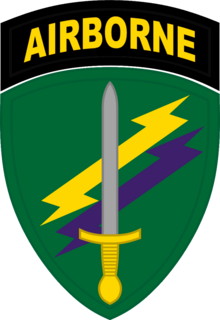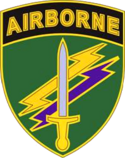This article needs additional citations for verification. (February 2017) |
| United States Army Civil Affairs and Psychological Operations Command (Airborne) | |
|---|---|
 U.S. Army Civil Affairs & Psychological Operations Command (Airborne) shoulder sleeve insignia. | |
| Active | 1990–present |
| Country | |
| Branch | |
| Type | |
| Role | |
| Garrison/HQ | Fort Liberty, North Carolina |
| Website | USACAPOC(A) official website |
| Commanders | |
| Current commander | BG Andrée G. Carter |
| Insignia | |
| Distinctive unit insignia of the command |  |
| Unit flash of the command |  |
| Combat service identification badge |  |
The United States Army Civil Affairs and Psychological Operations Command (Airborne), USACAPOC(A), or CAPOC was founded in 1985 and is headquartered at Fort Liberty, North Carolina.[1] USACAPOC(A) is composed mostly of U.S. Army Reserve Soldiers in units throughout the United States. The size of the Command is nearly 13,500 Soldiers,[2] which is 76% of the Department of Defense's Civil Affairs forces and 63% of Psychological Operations forces.[3]
Historically, USACAPOC(A) was one of four major subordinate commands composing the U.S. Army Special Operations Command (USASOC). In May 2006, the reserve component of USACAPOC(A) was administratively reorganized under the U.S. Army Reserve Command. The administrative move, however, does not detract from the capability of Army Reserve Civil Affairs Soldiers ability to carry out missions in support of unconventional environments or special operations. Both Active and Reserve component Civil Affairs Soldiers are products of the special operations community, they must go through qualification training at the John F. Kennedy Special Warfare Center and School. The Army Reserve Civil Affairs is considered to be more dynamic than that of their Active duty counterparts. The largest difference being, while the Active component’s focus is mainly on unconventional environments, individual Soldiers from the Army Reserve Civil Affairs may be tasked with supporting both conventional or unconventional operations. In addition, the Army Reserve Civil Affairs largely maintains functional skills or specialties that the Active Component is typically unable to, due to the nature of a separate civilian career or the professional backgrounds of many Reserve Soldiers. The Army's active duty Special Operations Civil Affairs and Psychological Operations units, along with the Civil Affairs and Psychological Operations Force Modernization/Branch Proponents, continue to fall under the U.S. Army Special Operations Command and United States Army John F. Kennedy Special Warfare Center and School, respectively. The Active Component Civil Affairs Brigade—the 95th Civil Affairs Brigade—and the two active component Psychological Operations Groups—the 4th Psychological Operations Group and the 8th Psychological Operations Group—fall under USASOC.[4]
U.S. Army Reserve Civil Affairs and Psychological Operations constitute 5% of the U.S. Army Reserve's total force, but account for approximately 20% of Army Reserve deployments. Reserve Civil Affairs are deployable specialized forces within the Reserve. Reserve Soldiers often bring civilian expertise and education that is typically not found among active-duty soldiers. The projects these elements coordinate are worldwide, but more recently have focused on Iraq, Afghanistan, and the Horn of Africa regions.[citation needed]

- ^ Pike, John. "Army Civil Affairs and Psychological Operations Command (Airborne)". GlobalSecurity.org. Retrieved 21 April 2016.
- ^ Brooks, Drew (21 October 2017). "Guthrie takes command of USACAPOC". The Fayetteville Observer. Retrieved 30 September 2019.
- ^ "About Us". U.S. Army Civil Affairs & Psychological Operations Command (Airborne). Retrieved 26 October 2021.
- ^ "Our Commands: U.S. Army Reserve Command: About Us". U.S. Army Reserve. Retrieved 21 April 2016.